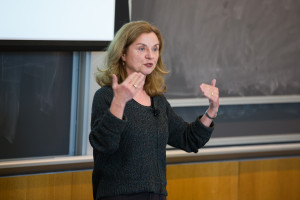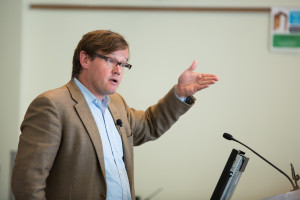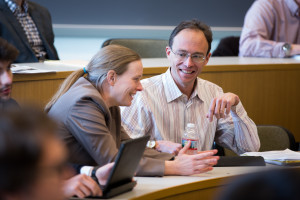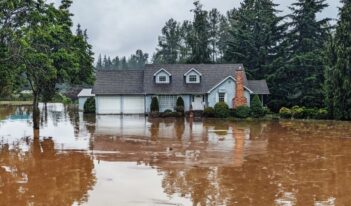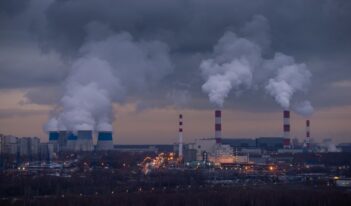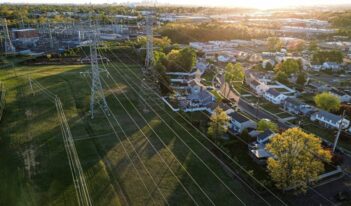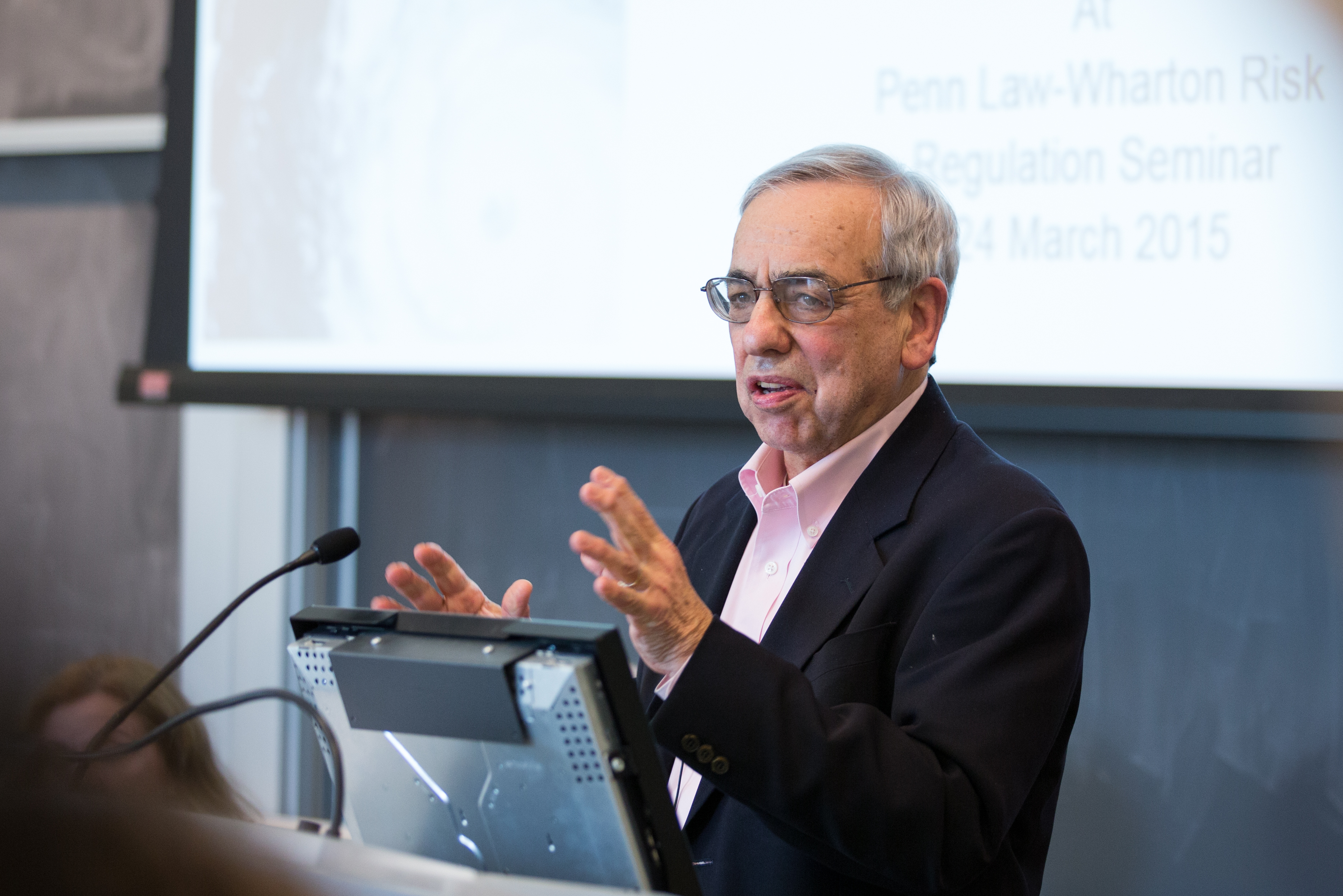
PPR panel addresses the risks of climate change and the realities of reaching an international agreement.
Sea levels are rising. Oceans are warming. Storms are intensifying and becoming more frequent. These are the realities of a changing climate, caused at least in part by human activity. World leaders are taking note, but reaching a global treaty on how to address climate change still seems like a tall order.
Recently, the Penn Program on Regulation brought together a panel of climate change experts as part of its Risk Regulation Seminar Series. Moderator Howard Kunreuther, Co-Director of the Wharton Risk Management and Decision Processes Center, introduced the session by reviewing major findings from the Intergovernmental Panel on Climate Change’s (IPCC) most recent report documenting climate science and its implications.
Each of the panelists, along with Kunreuther, contributed to the latest IPCC report, and their presentations helped set out the key issues that will confront the world’s leaders at the upcoming United Nations Framework Convention on Climate Change in Paris, where countries are hoping to come together in November to try to strike a deal on climate change.
In addition to surveying the scientific evidence on climate change and its impacts, the IPCC’s latest report – its Fifth Assessment Report, or AR5 – surpassed previous reports by highlighting ethical issues relevant to climate change, formally analyzing uncertainties in climate science, and laying out the data to support a global target of limiting warming to 2 degrees Celsius.
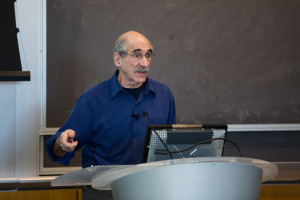
Michael Oppenheimer, Albert G. Milbank Professor of Geosciences and International Affairs at Princeton University
Michael Oppenheimer, a professor of geosciences and international affairs at Princeton University, began the panel by explaining that current impacts of climate change are already widespread, and that future impacts on agriculture, coastal regions, and human health are staggering. Climate change is already beginning to threaten the food supply, he said, as the agricultural system faces declining crop yields due in part to extreme heat. Coastal flooding, driven by rising sea levels, is also increasingly frequent and devastating, although it affects different areas disparately, he noted. Despite the message of urgency surrounding climate change, Oppenheimer expressed doubt that the Paris negotiations would lead to any major breakthrough.
Elke Weber, a professor of psychology and business at Columbia University who worked on the AR5 as a behavioral science expert, described climate change as a “perfect storm” collective action problem, as the costs of action will be “painful” and immediate, while the benefits tend to be distant and diffuse. According to Weber, this asymmetry in the timing of costs and benefits is complicated by a “status quo bias” that humans around the world exhibit. Continuing the same strategy may feel like the “safe” option, but in reality it would be very dangerous, she suggested.
Moreover, there may be no single solution to combat the problem of climate change. According to Weber, “there is no silver bullet; all we have is silver buckshot.” Instead, she identified changes to the Paris negotiations that could improve the result. Pointing to research by Penn Law Professor Jean Galbraith, she noted that the way treaty negotiations are framed can make a difference in how likely agreement results. One option she mentioned would be to break the negotiations into to smaller pieces. Another option would be to do away with the requirement of unanimity, which Weber asserted, “is not a good rule to have” with such a large number of negotiating parties.
Ultimately, Weber pointed to the need for “action on all fronts” to address climate change. She advocated for the involvement of diverse parties, including politicians, economists, social scientists, designers of infrastructure, and even movie directors and playwrights, to further awareness of and increase action on climate change.
Finally, David Victor a political scientist and professor of international relations at the University of California, San Diego, delivered a dual message – of optimism and caution – about the geopolitical landscape leading up to Paris. On the one hand, Victor argued that there is more reason to be optimistic today about the prospect of reaching a meaningful agreement on climate change than anytime in the past twenty years. He pointed to the shift in diplomacy away from “consensus oriented” negotiations to what he called “pluralateral negotiations.” He likened the latter to an umbrella, with smaller groups of government and private actors that will make varied agreements, pointing to similar efforts already underway with respect to international trade and human rights.
Still, there are reasons to be more concerned about the state of climate change negotiations, Victor noted. For one, actors have a strong incentive to make lofty pledges that they cannot – or will not – achieve. Additionally, under the current regime, wealthy countries have an incentive simply to outsource emissions instead of actually reducing reliance on carbon emitting technologies, since carbon emissions are attributed to the country of production, rather than the consuming country. This problem, Victor claimed, is largely overlooked.
After the panelists’ presentations, Kunreuther asked if it is possible to take advantage of the fact that “people are worried today.” Panel members’ responses indicated that fear alone may not be enough, and that in any event people simply are not scared enough about the realities of climate change yet.
In the end, the panelists offered a set of wishes for the upcoming talks in Paris. Among these was a desire for the negotiating countries to abandon emissions targets and a quest for a single, consensus-based treaty, making way instead for smaller scale agreements. Another hope was to establish a plan for after Paris, so that any agreements that are reached can move forward and be implemented without delay.
One panelist’s wish for Paris seemed to sum up well the general tone of the entire seminar – admonishing parties in Paris to “expect little and hope for the best.”
As the Climate Summit in Paris draws nearer, the AR5’s findings, as well as the insights from the panel’s conversation, will no doubt continue to inform the debate over the risks of climate change, and what must be done to address them.
The monthly Risk Regulation Seminar series at the University of Pennsylvania is regularly organized and sponsored by the university-wide Penn Program on Regulation centered at the University of Pennsylvania Law School as well as by the Wharton Risk Management and Decision Processes Center. The panel discussion on climate change was also co-sponsored by Penn’s new Kleinman Center for Energy Policy as well as the Wharton-led Initiative on Global Environmental Leadership.

